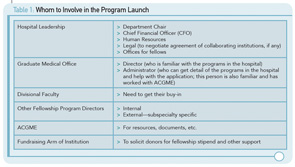Lawrence K. Jung, MD, program director of the training program in pediatric rheumatology at Children’s National Medical Center Program, Washington, D.C., who reestablished a pediatric rheumatology fellowship in that hospital after many years of not having one, also agreed that funding is a key challenge in launching a new program. The program was approved in 2013, and the first fellow started in 2014.
Although he says the hospital is fully supportive of the program, the onus of the funding falls on his shoulders. “I need to do fundraising and look to philanthropic sources,” he says, adding that the commitment to the program by the hospital is that it will supplement the funding raised by Dr. Jung. “We are approved by ACGME [Accreditation Council for Graduate Medical Education] for two positions,” he says, “and the hospital will supplement funding for the first position.”
Funding also comes from the National Institutes of Health (NIH), which funds the last two years of the three-year fellowship program for fellows who are accepted by the NIH to spend their final two years doing research at the NIH. “If the fellow chooses not to do research with the NIH for the second and third year, then we have to come up with an alternative funding source,” says Dr. Jung, who is also chief of the Division of Rheumatology.
Support from Colleagues
Kelly A. Rouster-Stevens, MD, program director of the pediatric rheumatology training program at Emory School of Medicine, Atlanta, emphasizes the critical support needed from colleagues in completing the necessary paperwork to obtain accreditation.
“Completing the Program Information Form (PIF) was a daunting task,” she says, saying that formulating their PIF would not have been possible without the help of her colleagues.
Their program received approval from the ACGME in 2012 and had its first fellow start in July 2014, with a goal of having three fellows (one per year).
Dr. Rouster-Stevens, who is also assistant professor of pediatrics, emphasizes the critical support of a fellowship coordinator, who was instrumental in helping her learn about the internal medicine subspecialty milestones, entrustable professional activities (EPAs) and various components of maintaining accreditation. The coordinator also helps her organize fellowship applicants, arranges interviews and keeps her updated on applicants.
Dr. Roberts also emphasizes the importance of working with supportive colleagues. He says his previous experience of 15 years as program director at the Virginia Commonwealth of Virginia, where he received strong support from several people in the Department of Medicine, was instrumental in his relaunching the fellowship program in Louisville.



